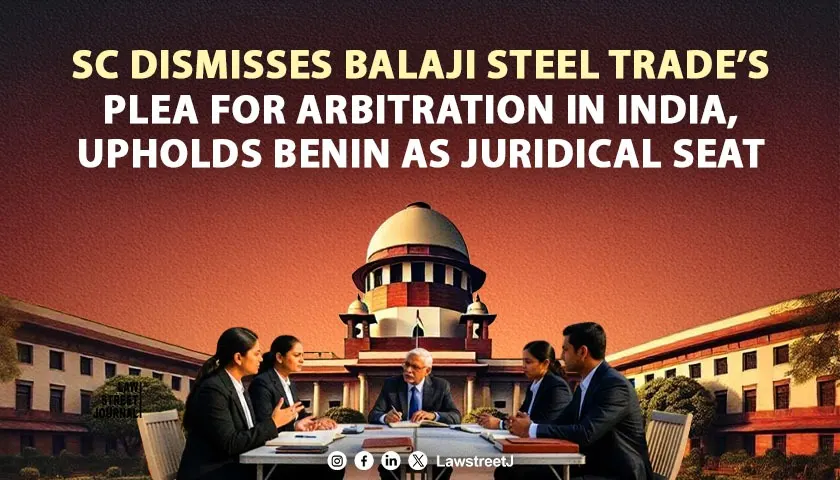New Delhi: The Supreme Court of India on November 24 dismissed an Arbitration Petition filed by Balaji Steel Trade, a partnership firm, under Section 11(6) read with Section 11(12)(a) of the Arbitration and Conciliation Act, 1996, seeking the appointment of a sole arbitrator for a composite reference of disputes arising from multiple contracts. The bench, comprising Justices Pamidighantam Sri Narasimha and Atul S. Chandurkar, held that the primary agreement between the parties designated Benin as the juridical seat of arbitration, thereby excluding the jurisdiction of Indian courts under Part I of the 1996 Act.
The dispute centered on a Buyer and Seller Agreement (BSA) dated 06.06.2019 and its Addendum dated 09.01.2021, executed between the petitioner, Balaji Steel Trade, and Respondent No. 1, Fludor Benin S.A., a company incorporated in the Republic of Benin. The BSA, which governed the long-term commercial relationship, included an arbitration clause in Article 11 stating: “All the disputes will be resolved by discussions and if Arbitration becomes only option then it will take place in Benin and decision will be binding on both the parties.” Furthermore, Article 5 of the Addendum expressly stated that the BSA “shall be construed, governed and interpreted in accordance with the laws of Benin.”
Balaji Steel Trade argued for a composite arbitration in India, relying on subsequent Sales Contracts executed with Respondent No. 2, M/s Vink Corporations DMCC, and High Seas Sales Contracts (HSSAs) with Respondent No. 3, Tropical Industries International Pvt. Ltd., both of which contained arbitration clauses providing for arbitration in New Delhi under the Indian Act. The petitioner contended that the BSA clause was novated by these later contracts, or, alternatively, that Benin was merely a venue and not the juridical seat. The petitioner also sought to invoke the ‘group of companies’ doctrine to bring all three respondents into a unified Indian arbitration.
The Supreme Court, however, rejected these submissions. In its analysis, the Court emphasized that the dispute squarely falls within the ambit of “international commercial arbitration” as defined under Section 2(1)(f) of the 1996 Act, and therefore Part I, including Section 11, is excluded by the operation of Section 2(2) since the place of arbitration is outside India.
The Court held that the BSA, being the “mother agreement,” clearly established Benin as the juridical seat. Referring to its precedents, the judgment noted:
“The BSA and its Addendum constitute the mother agreement, containing a clear and deliberate choice of Benin as the juridical seat of arbitration and Benin law as the governing and curial law. The subsequent Sales Contracts and HSSAs are merely ancillary, facilitating performance of isolated shipments, and cannot override the dispute resolution framework of the BSA.”
On the claim of novation, the Court observed that the subsequent Sales Contracts and HSSAs were “subsequent, limited-purpose instruments” confined to specific consignments and did not expressly substitute, novate, or supersede the BSA. The judgment stated:
“The arbitration agreements in the Sales Contracts or HSSAs cannot displace or override the arbitration clause in the BSA, and disputes rooted in the BSA must be resolved exclusively through the arbitration agreed therein, namely, arbitration seated in Benin and governed by Benin law.”
Crucially, the Court also noted the principle of “issue estoppel.” Prior to the Supreme Court petition, Balaji Steel Trade had filed an Anti-Arbitration Injunction Suit before the Delhi High Court seeking to restrain the Benin arbitration, which was dismissed on 08.11.2024. The High Court held that the BSA, Addendum, and the Sales Contracts/HSSAs were “distinct contracts having different parties, differing scope of work and different arbitration clauses.” The Supreme Court held:
“The petitioner, having unsuccessfully canvassed the very same assertions before the High Court, is now barred by issue estoppel from reagitating those issues in a slightly altered statutory setting. The doctrine applies with full force even though the present proceeding is under Section 11 and the earlier one was under Section 45, for the identity of the issue—namely the operative agreement, the seat of arbitration, and the scope of the respective arbitration clauses—remains the same.”
The Court further noted that the arbitration process in Benin had already culminated in a final award dated 21.05.2024, rendered by the sole arbitrator, Dr. Gilbert Ahouandjinou, appointed by the Commercial Court of Cotonou, Benin. Allowing a parallel arbitration in India would be “wholly antithetical to the principles of finality of arbitral proceedings.”
Finally, the Court found the reliance on the “group of companies” doctrine to be “misplaced,” reiterating that a mere overlap of shareholding or the fact that entities belong to the same corporate family is not sufficient to bind a non-signatory to an arbitration agreement without compelling evidence of mutual intention.
Consequently, the Arbitration Petition was dismissed.
Case Details
- Case Name: Balaji Steel Trade v. Fludor Benin S.A. & Ors.
- Citation: 2025 INSC 1342
- Court: Supreme Court of India, Civil Original Jurisdiction
- Date of Judgment: November 21, 2025
- For Petitioner: Mr. Devadatt Kamat, Senior Counsel, assisted by Ms. Shruti Sabharwal, Mr. Nishant Doshi, and others
- For Respondent No. 1: Mr. Nakul Dewan, Senior Counsel, assisted by Mr. Susshil Daga, Mr. Pallav Mongia, and others
- For Respondent No. 2: Counsel for M/s Vink Corporations DMCC
- For Respondent No. 3: Counsel for Tropical Industries International Pvt. Ltd.











